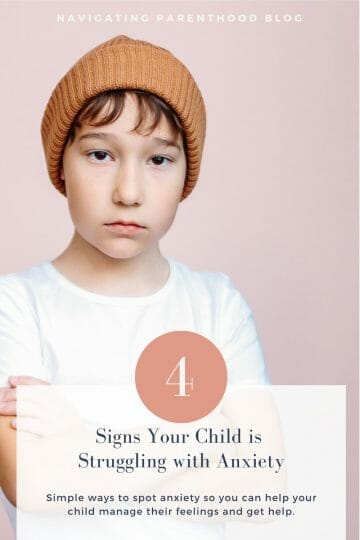4 Signs Your Child is Struggling with Anxiety
All of us, including children, experience anxiety from time to time. Many parents can recall the anxious cries of their toddler when saying bedtime goodbyes. Or, consoling a worried grade-schooler before a big school exam. However, anxiety can be a problem when it’s experienced too often or too intensely. How do you know your child is struggling with anxiety? Here are four signs.

Worries constantly
Children struggling to manage significant anxiety often appear overly tense or uptight. They may even appear to be a chronic worrier. You may notice that your child worries too often or is unable to control an endless list of worries. Common worries can include thunderstorms, fitting in with (or making new) friends, physical appearance, school-related issues, and family matters.
Increased temper
You may notice that your child complains a lot, is irritable, short-tempered, or sullen. Constant anxiety, stress, and worrying causes an increase in hormones which can negatively affect your child’s mood. Irritability can also be caused by constant or pervasive feelings of being on edge or constant nervousness.
Eager to please
Anxious children may also be quiet, compliant, and eager to please. They may seek a lot of parental guidance and reassurance. New situations or people may be very distressing or cause significant anxiety. Pay particular attention if your child is eager to please or compliant. Your child’s good behavior does not exclude them from struggling with anxiety or excessive worrying.
Physical disturbances
Anxious children may regress and begin bedwetting or may have disturbed sleep, including nightmares. Increased anxiety may also cause increased heart rate, chest discomfort, or palpitations. Your child may complain of shortness of breath or sweaty palms. There may be frequent complaints of stomachaches, tiredness, or weakness.
Parents should be alert to the signs of severe anxiety so they can intervene early to prevent complications such as low self-esteem, loss of friendships, and academic problems. Anxiety disorders in childhood, while common, are treatable and manageable conditions.


Dr. Carlin Barnes and Dr. Marketa Wills — two Harvard-trained psychiatrists — are the co-authors of the newly published, groundbreaking book “Understanding Mental Illness: A Comprehensive Guide to Mental Health Disorders for Family for Family and Friends” and founders of Healthy Minds, LLC.

